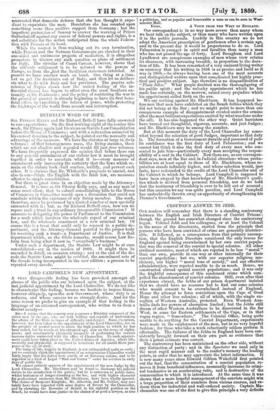LORD CAMPBELL'S NEW APPOINTMENT.
A 'VERY disagreeable feeling has been provoked amongst all classes of the public who are informed upon the subject, at the last judicial appointment by the Lord Chancellor. We do not like to characterize this feeling, because we hesitate to impose blame, however obliquely, upon the new Government, whose duty is so arduous, and whose success we so strongly desire. And for the same reason we prefer to give an example of that feeling in the language of an esteemed correspondent, who writes to us from a distant county-
Eir—I rejoice that the country now possesses a Ministry composed of the ablest men of the age, who are both willing and capable of undertaking the affairs of the State in times of difficulty and danger. Some exception, however, has been taken to the appointment of the Lord Chancellor, not on the grounds of mental power to adorn the high position to which he has been called, but by reason of his advanced age, now on the verge of eighty years; and consequently physically incapable of performing the various onerous duties connected with the office of Chancellor. No such appoint- ment could have taken place in the United States of America, where life, mentally and physically, is supposed to terminate for all useful State pur- poses at the age of sixty.
The lamp of life, happily in England, is not extinguished quite so early ; yet we certainly think the appointment of an octogenarian Chancellor would fairly imply that his duties were purely of an honorary nature, and to be regarded as a kind of Legal "Star and Garter" order for services in early days of public life. We cannot entirely approve of the appointment of the new Judge by the Lord Chancellor. Mr. Blackburn may be found to discharge his judicial duties to the satisfaction of the public, but he is unknown to public fame, whilst banisters of longer standing at the bar, and with higher character for ptofessional eminence than Mr. Blackburn, have been wholly ignored. The claims of Sergeant Kinglake, Mr. Atherton, and Mr. Collier, may cer- tainly have been regarded with some degree of favour by the Chancellor, and by elevating the Recorder of Bristol to his rightful position on the Bench, he would have done justice to the claims of as good a-lawyer, as true a politician, and as popular and honourable a man as can be seen in West- minster Hall.
Yours, A VOICE FROM THE WEST OF ENGLAND.
Our correspondent is in no way more severe than many whom we hear talk on the subject, or than many who have written upon it in the public journals. Luckily in this country we do not adopt the American proscription of gentlemen after a certain age, and in the present day it would be preposterous to do so. Lord. Palmerston is younger in spirit and faculties than many a man who has not passed the age of forty. Lord Brougham and Lord Lyndhurst are conspicuous examples of men whose view retains its clearness, with increasing breadth, in proportion to the dura- tion of life. It has been remarked of a very eminent living writer on currency that his writing in 1858 is as precise and lucid as it was in 1808,—he always having been one of the most accurate and distinguished writers upon that complicated but highly prac- tical and positive subject. Age therefore is no disqualification of "Plain John." What people doubted was the thoroughgoing of his public spirit ; and the unlucky appointment which he has made has certainly, on the morrow, raised every prejudice which his appointment called forth on the eve. We say nothing against Mr. Blackburn. It has happened be- fore now that men have exhibited on the Bench foibles which they did not betray at the Bar ; and we might point to more than one conspicuous example of disappointment created under the ermine after the most brilliant expectations excited by whatwas done under the silk. It has also happened the other way. Quiet barristers have turned out thoughtful, vigorous, accurate, and just Judges ; and Mr. Blackburn may be among the number. But at this moment the duty of the Lord Chancellor lay some- what beyond the selection of good Judges, important as that duty is. The formation of a Government durable and possessed of pub- lic confidence was the first duty of Lord Palmerston ; and we cannot but think it also the first duty of every man who con- sented to join him—particularly every man accepting the respon- sibility of a seat in the Cabinet. Now there are, as our correspon- dent says, men at the Bar and in Judicial situations whose proba- bilities are at least equal to those of Mr. Blackburn, whose re- putation stands infinitely higher, and whose selection would, ipso facto, have redounded to the credit of the Lord Chancellor and of the Cabinet to which he belongs. Lord Campbell is supposed to have been swayed by that knowledge of Mr. Blackburn's quali- ties which is derived from personal friendship, nor do we hold that the testimony of friendship is ever to be left out of account ; but this occasion we say was quite peculiar, and Lord Campbell has undoubtedly thrown away an opportunity of strengthening his Premier's Government.


























 Previous page
Previous page